If you're an ECR interested in consciousness research / psychiatry, do consider applying for the next MESEC Workshop in Lago di Bolsena, Italy (30th August - 7th September 2025)!
11.04.2025 07:33 — 👍 2 🔁 0 💬 0 📌 0If you're an ECR interested in consciousness research / psychiatry, do consider applying for the next MESEC Workshop in Lago di Bolsena, Italy (30th August - 7th September 2025)!
11.04.2025 07:33 — 👍 2 🔁 0 💬 0 📌 0
Thank you to study lead @rosmcalpine.bsky.social , and collaborators Merve Utanğaç, Joanna Kuc, Henok Pankhurst, Milly Sellers, Doug Kraft, Andrew Litchy, Naina Eira Gupta, @christimmermann.bsky.social , and Sunjeev Kamboj
The study of >100 experienced meditators and psychedelic ...

Can our core subjectivity survive bodily death? | https://buff.ly/2V6PU4D
@bernardokastrup.bsky.social uses the work of Arthur Schopenhauer to explore the conception of self.
#philosophy #consci #philsci

Happy to announce funding for, and founding of, the MIT Consciousness Club
shass.mit.edu/mit-human-in...
#neuroscience
1/ Here are some of the books I read and listened to this past year, mostly in order. Some real gems, as always. “A life without books is a life not lived” Jay Kristoff.
27.12.2024 19:24 — 👍 21 🔁 3 💬 3 📌 0Fascinating work showing that ants working in groups outperform individual ants in solving the piano movers’ puzzle. Human groups do not show such improvement and can even perform worse than an individual person, if communication is restricted. #neuroscience 🧪 🧠
26.12.2024 20:28 — 👍 159 🔁 34 💬 8 📌 3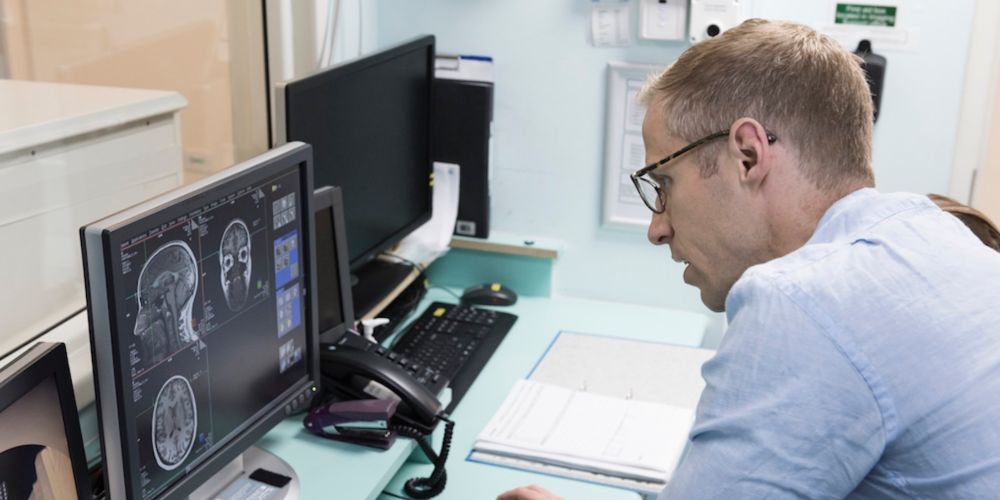
I'll be talking about all things metacognitive on 23rd Jan in a public lecture at the @royalsociety.org
It's free to attend and will also be broadcast live on the RS YouTube channel (no pressure then 😅)
royalsociety.org/science-even...
I co-edited a special issue on dreaming and mind wandering for @phimisci.bsky.social
The first papers are now online. Check them out!
And don't hesitate to follow/read this amazing, free & open access journal!
🔬🧠💤💭
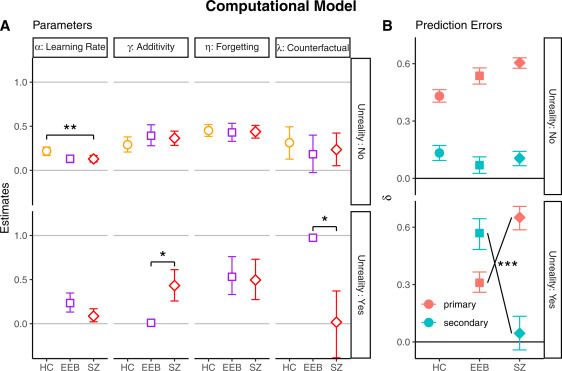
New from us:
People with delusions sometimes feel that the world is unreal.
Here, we explain this in terms of prediction errors, with Kamin blocking behavioral and computational data from patients, psychics, and controls
www.biologicalpsychiatrycnni.org/article/S245...

Meet Nicolas Decat, our scientist-artist at @dreamteamicm.bsky.social
www.nature.com/articles/s42...
This beautiful interview is a tribute to Nicolas' passion for science and talent for turning it into images that tell stories!
He started with nothing but his ideas. Dedication pays off!

Honoured to be included in Webdelics’ list of Top 25 Emerging Leaders in Psychedelic Research and Modern Theory, alongside so many inspiring friends and colleagues.
You can check out the full list here: www.webdelics.com/top-25-emerging-leaders-in-psychedelic-research-and-modern-theory

The claim that consciousness constitutively involves self-consciousness has a long philosophical history, and has received renewed support in recent years. My aim in this paper is to argue that this surprisingly enduring idea is misleading at best, and insufficiently supported at worst. I start by offering an elucidatory account of consciousness, and outlining a number of foundational claims that plausibly follow from it. I subsequently distinguish two notions of self-consciousness: consciousness of oneself and consciousness of one’s experience. While ‘self-consciousness’ is often taken to refer to the former notion, the most common variant of the constitutive claim, on which I focus here, targets the latter. This claim can be further interpreted in two ways: on a deflationary reading, it falls within the scope of foundational claims about consciousness, while on an inflationary reading, it points to determinate aspects of phenomenology that are not acknowledged by the foundational claims as being aspects of all conscious mental states. I argue that the deflationary reading of the constitutive claim is plausible, but should be formulated without using a term as polysemous and suggestive as ‘self-consciousness’; by contrast, the inflationary reading is not adequately supported, and ultimately rests on contentious intuitions about phenomenology. I conclude that we should abandon the idea that self-consciousness is constitutive of consciousness.
My article 'Constitutive Self-Consciousness' is now published online in the Australasian Journal of Philosophy. It argues (spoiler alert!) against the claim that self-consciousness is constitutive of consciousness.
17.12.2024 11:29 — 👍 20 🔁 3 💬 1 📌 0
On behalf of the #ASSC28 Scientific Program Committee, the Symposia and Tutorials are now announced 🥳
assc2025.gr/programme/sy....
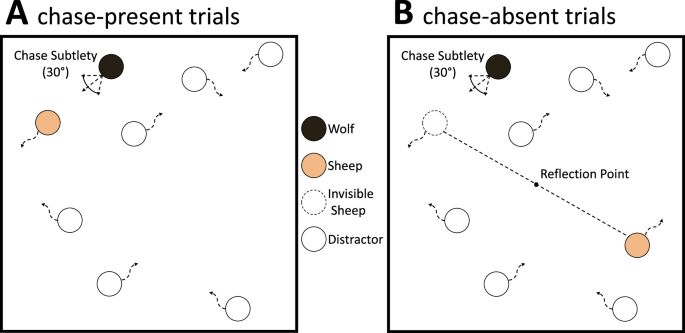
Out today: we discovered a new class of social hallucination - perception of chasing with high confidence. It is elevated in people who are paranoid and people who perceive meaning in the universe www.nature.com/articles/s44...
17.12.2024 11:54 — 👍 298 🔁 91 💬 14 📌 17
Mona-Marie Wandrey & me on the need to take a precautionary approach towards patients in a so-called "vegetative state" (and the term is part of the problem!). theconversation.com/its-hard-to-...
12.12.2024 13:31 — 👍 39 🔁 10 💬 3 📌 1
This app is no good for posting extended commentary since it gets chopped up, but on FB I agree with @philipgoff.bsky.social, not Andy Clark and @keithfrankish.bsky.social (see their nice Mind Chat), that PP ala Andy leaves something out about experience.
www.facebook.com/naturalism/p...

Finally published:
“Metastability demystified — the foundational past, the pragmatic present and the promising future”
rdcu.be/d3bh9
All about metastability: what the heck it is, how to measure it in models and data, and how to interpret it in neuroscience!
Great work from Emilia exploring attentional focus. This could be an interesting avenue to explore DoC patients. The rest of the amazing work that Emilia did during her PhD will soon go out. Stay attentive!
10.12.2024 16:37 — 👍 12 🔁 3 💬 1 📌 0
Anyone interested in an EEG head tattoo?
www.cell.com/cell-biomate...
🧠📈 🧪
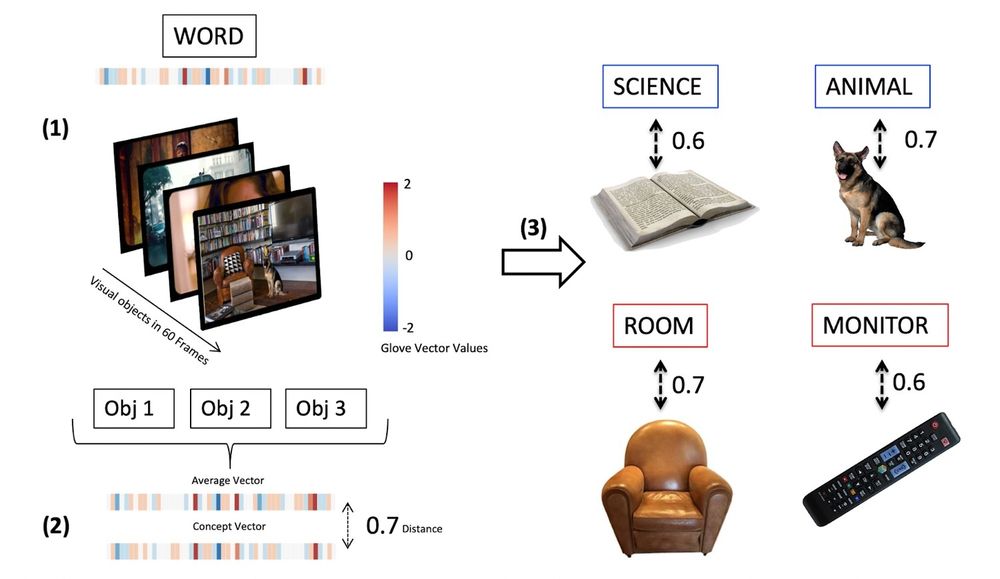
Naturalistic encoding of concepts in the brain
@viktorkewenig.bsky.social shows that, while concepts generally encode habitual experiences, the underlying neurobiological organisation is not fixed but depends dynamically on available contextual information. 👏🍾🐐
elifesciences.org/articles/91522

🧠 www.nature.com/articles/s41...
"... when mice are exposed to traumatic social stress, susceptible animals become socially withdrawn and anhedonic ... Manipulation of vCA1 inputs to the BLA in susceptible mice rescued dysfunctional neural dynamics... and reversed anhedonic behaviour.... "

Mind Chat is back 4pm today (UK time)! Great interview with leading philosopher and cognitive scientist Andy Clark. It's a pre-record but at least one of me and @keithfrankish.bsky.social will join you in the live chat.
www.youtube.com/watch?v=taDM...
‘An investigation into the varieties of extended difficulties following psychedelic drug use: Duration, severity and helpful coping strategies’
Full text: akjournals.com/view/journal...

New publication by CPCR Faculty Albert Garcia-Romeu, Sandeep Nayak, Nathan Sepeda, and colleagues! www.sciencedirect.com/science/arti...
03.12.2024 21:41 — 👍 19 🔁 8 💬 2 📌 0
New paper! This was a fun lil collaboration with Maastricht University in which we thought we might find evidence that ayahuasca would increase false memory in an observational study. WRONG! Ended up enhancing memory (but read 'til end for caveats)
journals.sagepub.com/doi/10.1177/...
1/8

finally published! Optimal metacognitive decision strategies in signal detection theory -- with the brilliant Brian Maniscalco and Lucie Charles
#neuroskyence #neuroAI #metacognition #consciousness #psychology
link.springer.com/article/10.3...

✨Our paper is out in Nature today! ✨
In this work, we investigated how we can leverage study designs to improve the replicability of brain-wide association studies (BWAS)
👇👇👇
www.nature.com/articles/s41...
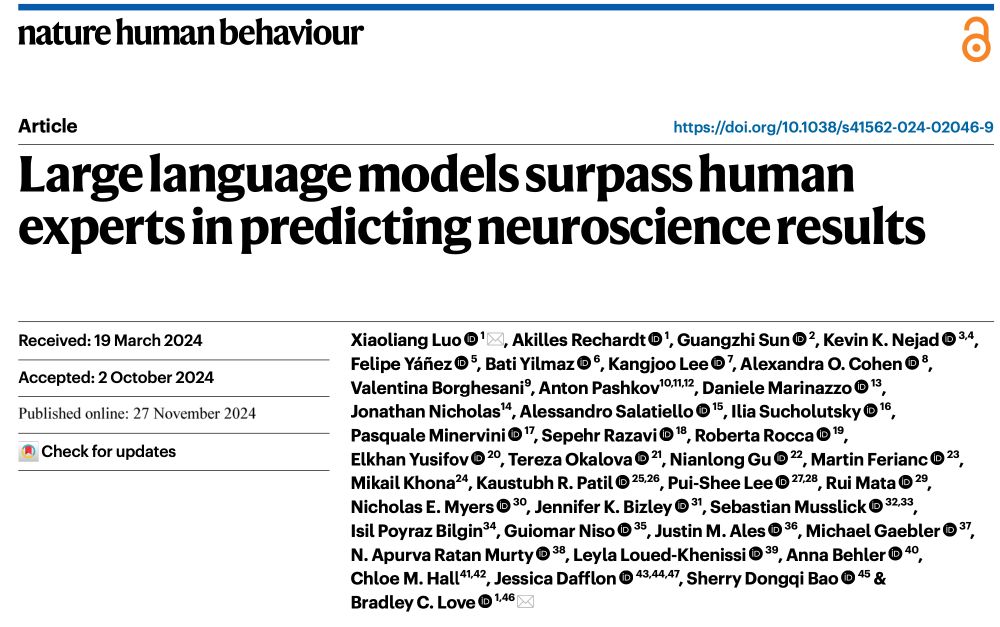
"Large language models surpass human experts in predicting neuroscience results" w @ken-lxl.bsky.social
and braingpt.org. LLMs integrate a noisy yet interrelated scientific literature to forecast outcomes. nature.com/articles/s41... 1/8

Sleep-like state during wakefulness induced by psychedelic 5-MeO-DMT in mice
www.biorxiv.org/content/10.1...

There are also exciting ways we can take this forward. for example, we could expand the types of thoughts we used mDES to measure, such as to include awareness of our bodies - see this cool work by @leahbanellis.bsky.social and @micahgallen.com
www.biorxiv.org/content/10.1...